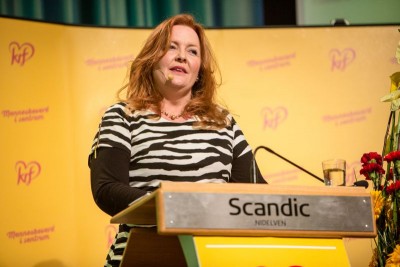At least one of the two parties supporting Norway’s minority coalition government is keen to discuss instead of rail against the government’s proposed state budget. The Christian Democrats think it’s “premature” to talk about any budget “crisis,” while economists have generally given the budget proposal good marks.

“To talk about a ‘crisis” before we have even talked together is premature,” Dagrun Eriksen, deputy leader of the Christian Democrats, told newspaper Aftenposten over the weekend. She expressed irritation at the government’s other support party, the Liberals, whose leaders have blasted the budget presented on Thursday, and threatened to withdraw their support for the government coalition itself.
The Christian Democrats think the Liberals have painted themselves into a corner. Liberals’ leader Trine Skei Grande had demanded “the greenest budget of all time,” including hefty fuel tax hikes, before the budget was presented. When only minimal tax hikes were proposed, Grande threatened to all but topple the government.
That hasn’t been well-received by either the Christian Democrats or the two government parties, especially the conservative Progress Party. Newspaper VG reported that nearly half of the Progress Party’s county leaders think it should withdraw from the government cooperation rather than concede to the Liberals’ demands for fuel tax hikes. “If they (the Liberals) pose an ultimatum, I think we should just go out of the government,” Aina Stenersen, county leader for the Progress Party from Oslo, told VG.
Crisis likely to be averted
Few think the budget conflicts will come that far. The Conservatives, the Progress Party, the Christian Democrats and the Liberals have overcome differences during their past three years of cooperation, and Grande herself has admitted there are other “green” aspects to the budget. The Liberals almost always side with the conservative side of Norwegian politics as well, so it’s unlikely they’d want to be responsible for ushering in a change of government that would put the Labour Party in power less than a year before next fall’s elections.
Three professors and researchers who specialize in politics and elections also dismissed talk of any government collapse. “The government is actually reasonably popular,” Svein Erik Tuastad of the University of Stavanger told newspaper Aftenposten on Monday. Even if the Liberals won’t back the budget in Parliament, Tuastad, Frank Aarebrot of the University of Bergen and researcher Johannes Bergh think the government will get support for it from other parties, and remain in power.
More than 20 economists polled by newspaper Dagens Næringsliv (DN), meanwhile, generally gave the budget good marks, with a majority grading it with a score of four on a scale of one to six. Four gave it a score of five, noting that it was less expansive than the year before. “That’s sensible, since growth in the Norwegian economy looks like it’s rising,” Kari Due-Andresen, chief economist at Handelsbanken, told DN. “The budget is in line with the central banks’s expectations.”
Knut Sunde of industrial organization Norsk Industri, also gave the budget a high score, while most, like Kyrre Aamdal of DNB Markets, gave it a score of four. Aamdal also, however, praised the budget’s “moderation” even though most sectors will be getting more money than last year.
As initially predicted, the transport ministry was the budget winner, with its allocation up 25.3 percent over last year. Much of its higher funding will be used to improve roads and trains, both of which will also generate more jobs. Both the ministries for oil, business and fisheries were slapped with 22.8 percent declines in funding, while the ministry for climate and environmental issues saw an increaase of 7.8 percent. Most other ministries received relatively modest increases of around 3-6 percent.
newsinenglish.no/Nina Berglund

